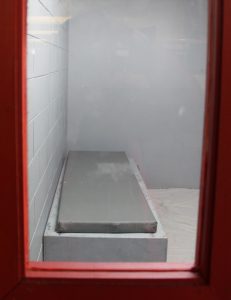[media-credit id=188 align=”alignleft” width=”231″] [/media-credit]
[/media-credit]
A demonstration of solitary confinement was on display in the Reeve Memorial Union Concourse to help demonstrate social injustices in our justice system on Wednesday as part of Social Justice Week at UW Oshkosh.
Solitary confinement is the isolation of a prisoner in a separate cell, away from other prisoners, as a punishment.
UWO social work major Amanda Vue said the reason the display is being demonstrated for Social Justice Week is so people can learn and see the problems with solitary confinement first-hand.
“We are trying to bring to light on how our system treats and handles inmates and criminals,” Vue said. “Solitary confinement causes a lot of mental issues for inmates and is being used on inmates who already have mental issues worsening these conditions. They spend 23 hours a day in these confined areas.”
Vue said the most common reasons people are put into solitary confinement is because either they are violating prison regulations or they are a high risk inmate.
“The concept behind solitary confinement is to have inmates think about what they have done wrong with no distractions,” Vue said.
Vue said the United States is one of the few democratic countries that still practices solitary confinement in their criminal justice system.
“First of all, it is a very expensive practice and most countries don’t even use this practice,” Vue said. “Other countries view this as torture and compared to international standards, the United States is very loose on their standards on what is and isn’t considered torture.”
UWO sophomore Brett Wilson went into the solitary confinement model and said he was only in there for a few minutes before he wanted to get out.
“I think that solitary confinement is inhumane,” Wilson said. “It’s very small in there and sterile and if I had to stay in there for hours on end, I know I would go crazy.”
Social Justice Week volunteer Angie Zemke said this system affects everyone in Wisconsin and action to reform solitary confinement goes past just inhumane treatment of inmates.
“Some people have a hard time sympathizing with the inmates, so what we tell people who don’t think this should be reformed is that this treatment is coming out of your tax dollars and other alternative ways of handling inmates would actually be less expensive,” Zemke said.
Vue said the solitary confinement system is setting up inmates to return back into the system.
“Once they are released out of the system, they will have a harder time adjusting back and most likely will end up back in the system,” Vue said.
Vue said the United States needs to look into other alternatives and end the practice of solitary confinement.
“I think instead of putting inmates in this box, they should be helping them and getting them counseling help,” Vue said. “Helping them get mental help and having them socialize and having them be more involved in the community are better alternatives than what is currently going on in our system.”












